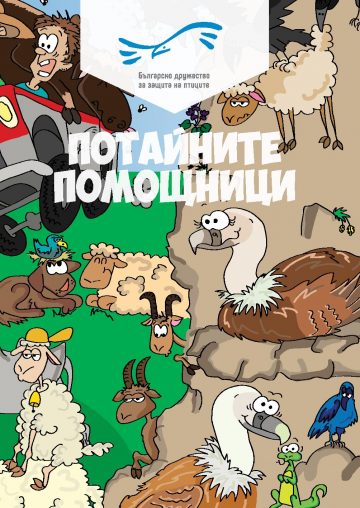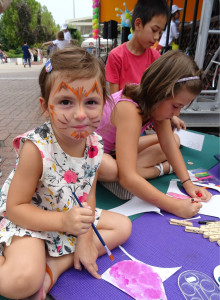Published as part of the LIFE Vultures project, the colourful publication gives kids a fascinating insight into the feathered denizens of the Rhodope Mountains rewilding area.

Reaching out to younger generations and inspiring them to learn more about the wild nature around them is a critical part of rewilding. Now flying off the shelves in Bulgaria, a new book entitled “The Secret Helpers” is giving kids a fascinating insight into the vultures living in southern Bulgaria’s Rhodope Mountains rewilding area.

Principally aimed at younger readers (students in grades 4 to 7), the new publication is also suitable for teenagers and adults who want to learn more about this beautiful area and its majestic feathered inhabitants. The end of the book contains drawings, illustrations and games where all the information learned over the previous pages can be put to the test.
The book will be distributed free of charge during event openings, lectures and other special occasions, while visitors to the Vulture Information Centre in Madzharovo can also pick up a free paper copy. The book is also available online (in Bulgarian only) here.
Dr. Peter Yankov, the author of the book, is one of the founders of the Bulgarian Society for the Protection of Birds (BSPB), Rewilding Europe’s partner in the Rhodope Mountains rewilding area and the Rewilding Rhodopes Foundation board member. One of the first to work on the conservation of vultures in Bulgaria, Yankov lived for many years in Krumovgrad (a town in the rewilding area), writing a pioneering work on the Egyptian vultures of the Rhodopes at the end of the 1970s. The book’s colourful illustrations are by Vanya Angelova, who is also a BSPB team member.
“Secret Helpers” brings Bulgarian children closer to the quartet of vultures which frequent the Rhodope Mountains of Bulgaria – the bearded, the black, the griffon and the Egyptian vulture. They can read entertaining stories and learn fun facts about vulture biology, behaviour and characteristics, including the birds’ preferred nesting places and diet, and about how to distinguish between different species. They can also read about the vital yet often overlooked role which vultures play as scavengers, and about why it is becoming increasingly difficult for “nature’s cleaners” to find food in the wild.
In addition to vultures, the book also presents information on the anti-poison dog team attached to the Rhodope Mountains rewilding team. Niki Terziev and his four-legged partner Bars help detect and remove poisoned bait from the wild, ensuring the vultures of the Eastern Rhodopes can continue their essential comeback.

Last but not least, the new book also provides nature lovers with information about the area’s various rewilding-related campaigns and initiatives, so that everybody can become involved in protecting the precious vultures of the Rhodope Mountains.
This book has been published within the framework of the LIFE Vultures project entitled “Conservation of black and griffon vultures in the Rhodope Mountains”. Starting in 2016, this five-year project was developed by Rewilding Europe, in collaboration with the Rewilding Rhodopes Foundation, the BSPB and a range of other partners. Focusing on the Rhodope Mountains rewilding area in Bulgaria, as well as a section of the Rhodope Mountains in northern Greece, its aim is to support the recovery and further expansion of the black and griffon vulture populations in this part of the Balkans, mainly by improving natural prey availability, and by reducing mortality through factors such as poisoning, poaching and collisions with power lines.
Home to three different breeding species, the Rhodope Mountains of Bulgaria and Greece are a critical area for the recovery of European vultures. The Rhodope Mountains rewilding area is the only breeding site of Bulgaria’s indigenous griffon vulture population, while the area is also home to the largest population of the globally threatened Egyptian vulture on the Balkan peninsula.
